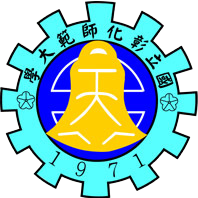SDG10.4.1 Number of students with disability
Number of students
The total number of FTE students in 2021 was 7,103, including 4,942
Bachelor’s students, 1,655 Master’s students, and 506 doctoral students.
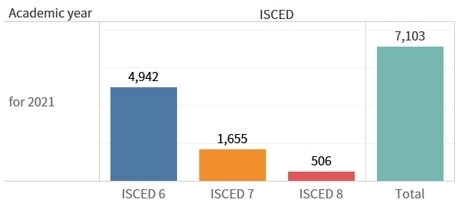
Number of students with disability
There were 103 students with disabilities in 2021, and the proportion of students with disabilities was 103/7103 =1.45%.
|
Educational system |
Extremely severe |
Severe |
Moderate |
Mild |
None (no grade or other category was filled in by the student (determined by the Committee Responsible for the Identification and Placement of Gifted and Disabled Students)) |
Total |
|
Doctoral programme |
1 |
0 |
1 |
1 |
0 |
3 |
|
Master's programme |
0 |
0 |
7 |
11 |
4 |
22 |
|
Bachelor's programme |
3 |
8 |
14 |
41 |
12 |
78 |
|
Total |
4 |
8 |
22 |
53 |
16 |
103 |
NCUE provides students with disabilities with a fair chance of admission by applying to study in NCUE through multiple approaches. After they are admitted, they are also provided with comprehensive care on enrollment and studies (including coursework guidance, support in daily life, and transition guidance). By establishing an accessible environment on our campus and ensuring their dormitory accommodation, the individual’s potential can be fully developed. Furthermore, the Ministry of Education has subsidized more than 2.39 million for NCUE to support students with disabilities with verification reports to adapt to university life. The details are as follows:
1. Providing students with disabilities with multiple admission channels
1.1 We are one of a few national universities to proactively pave the way for students with disabilities to enter into higher education: NCUE proactively paved the way for students with disabilities to enter into higher education by joining the National Joint University and College Admission System for Students with Disabilities. We admitted 10 students in this way in 2021. Since 2015, NCUE admits students with disabilities individually through a special system, and admitted seven students in this way in 2021. The system helps students with disabilities to enter a national university and pursue their dreams by majoring in their preferred disciplines.
1.2 To encourage departments to provide extra places for disadvantaged students, NCUE’s Measures of Establishing the Recruitment Strategy Committee and the Implementation stipulates that each department can receive an additional operating fund calculated according to the number of extra places (including those designated for overseas students, students with disabilities, and indigenous students) provided, amounting to 5,000 NTD multiplied by the actual number of students enrolled.
2. Supporting students with disabilities in their enrollment and studies
2.1 The Resource Classroom provides comprehensive enrollment and study services for students with disabilities: Various guidance and services that help students with disabilities adapt to university life are funded by the subsidies provided by the Ministry of Education, for which NCUE applies based on the Work Plan of Recruiting and Guiding University and College Students with Disabilities. The Ministry of Education subsidized more than 2.39 million NTD in 2021 to provide students with disabilities with appropriate services in counseling and assessment, and help them finish their studies successfully, with better adaptation to emotional issues, academic matters, society, and employment. We specifically arrange for these students to receive counseling during their studies, which includes general counseling, life counseling, and academic counseling. The support services include the following (please refer to https://ncue7232105.wixsite.com/ncue/blank-4):
|
Statistics of various services provided in the Resource Classroom |
Students served (person-times) |
|
Data query |
129 |
|
Use of equipment |
15 |
|
Printing coursework |
304 |
|
Self-study |
97 |
|
Exam service |
4 |
|
Data transfer |
7 |
|
Academic counseling |
146 |
|
Life counseling |
110 |
|
Transition counseling |
58 |
|
General counseling |
13 |
|
Other |
139 |
|
Types of services provided by the Resource Classroom |
Students served (person-times) |
|
Coursework tutoring |
120 |
|
Exam service |
14 |
|
Study companion service |
856 |
|
Equipment lending |
23 |
|
Learning materials conversion |
7 |
2.2 Academic support services: The Resource Classroom provides individual remedial teaching on difficult courses, exam services (explaining highlighted points, reviews of specific questions, etc.), learning material conversion, and learning equipment loans, while student helpers and volunteers are on site to help students with learning (adding/dropping courses, recording, explaining highlighted points, copying notes, etc.), and students can receive help with special education grant applications.
2.2.1 Individual remedial teaching (difficult courses):
The Resource Classroom arranges for students with disabilities to be individually taught by tutors on courses that are deemed difficult by them, such as psychological and educational tests, English, and statistics, helping them to catch up on coursework.
2.2.2 Examination services (explaining highlighted points, reviews of specific questions, etc.):
According to the types and degrees of disabilities of different students with disabilities, the Resource Classroom has designed a “Special examination service table” to provide appropriate help according to the needs of course teachers and students.
2.2.3 Learning assistance by student helpers and volunteers (adding/dropping courses, recording, explaining highlighted points, copying notes, etc.):
Student helpers and volunteers are arranged by the Resource Classroom to take shifts to help students add/drop courses, with recording, copying notes, and explaining highlighted points. Designated student helpers are also arranged to help students with disabilities search for information.
2.2.4 Learning material conversion:
Students receive help converting their textbooks into Braille or enlarged fonts, or convert written data to electronic files.
2.2.5 Students can apply to use assistive equipment
2.2.6 Application for special education scholarships and grants (handled by the Office of Student Affairs) and application for external scholarships and grants
2.3 Life support services: Regular orientation and mobility training are held to help students with disabilities familiarize themselves with the on-campus environment. Regular extracurricular activities, get-togethers, and teacher–student forums are held to allow students with special needs to get to know, understand, and support each other, while counseling teachers can exchange opinions with students and provide timely assistance. If the students face difficulties due to personal issues, they will be referred to the counseling center for psychological counseling (individual counseling and growth groups).
2.3.1 Orientation and mobility training:
The Taiwan Foundation for the Blind is usually invited to conduct orientation and mobility training to help blind students familiarize themselves with the campus environment as quickly as possible.
2.3.2 Extracurricular activities and get-togethers:
To allow students with special needs to get to know, understand, and support each other, the Resource Classroom hosts dinner parties, external visits, and experience sharing by alumni on civil service examinations or teacher selection exams for students at the beginning and end of each semester.
2.3.3 Student forums:
To promote the learning effectiveness of students in classes and to understand their progress, the Resource Classroom regularly holds forums for counseling teachers and students that allow counseling teachers to exchange opinions with students and provide timely assistance.
2.3.4 Psychological counseling (individual counseling and growth groups):
If students with disabilities face difficulties due to personal issues, the Resource Classroom will refer them to NCUE’s Psychological Counseling and Guidance Centre so that they can participate in individual counseling and growth groups.
2.3.5 Arrangement of on-campus accommodation and transportation
2.3.6 Assistance to improve the accessible environment
2.4 Support services concerning transition counseling: We provide student transition communication services, as well as graduate transition communication and tracking services.
2.4.1. Student transition communication services
2.4.2. Graduate transition communication and tracking services:
Students (person-times) served by different types of services in 2021
|
Type of supporting services |
Students served (person-times) |
|
Help with learning |
1,663 |
|
Life assistance |
331 |
|
Career and transition services |
67 |
|
Counseling |
124 |
Statistics of supportive activities provided by the Resource Classroom to students with disabilities in 2021
|
Supporting activity |
Students served (person-times) |
|
Student Forum, the second semester of the 2020 academic year |
42 |
|
Forum for Parents of Incoming Freshmen, the first semester of the 2021 academic year |
25 |
|
Sharing Session by Alumni with Disabilities, the first semester of the 2021 academic year |
16 |
|
University Career Preparation Group, the first semester of the 2021 academic year |
40 |
|
Field trip and practices, the first semester of the 2021 academic year |
17 |
|
Dinner Party and Gathering, the first semester of the 2021 academic year |
17 |
3. A campus environment with accessible facilities for students with disabilities
NCUE places considerable emphasis on building a campus environment with accessible facilities. The buildings and campus facilities are inspected and improved in accordance with accessibility regulations, while millions of NTD are spent annually to improve the accessible facilities. The total amount spent on the improvement of accessible facilities has reached 97.93 million NTD, providing consummate accessible facilities on campus. There are 23 major buildings on the campus, each of which is equipped with accessible elevators and accessible toilets, with a 100% installation rate. All accessible ramps, guide facilities, and accessible stairway hand railings in the buildings are set according to accessibility regulations.
Table: Accessible facilities available on campus
|
Accessible Facility |
Quantity |
Installation Rate |
|
Accessible elevator |
23 |
100% |
|
Accessible toilet |
61 |
100% |
|
Renovated accessible ramp |
19 |
100% |
|
Accessible stairway hand railings |
36 |
100% |
|
Guide facility |
26 |
100% |
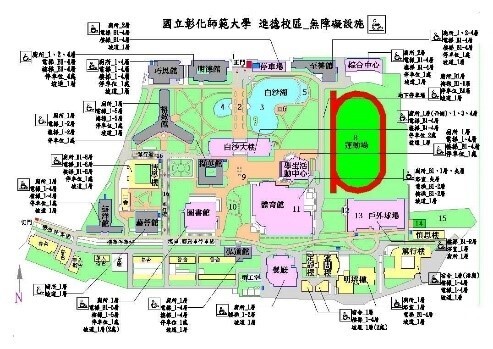
Map of the accessible facilities on NCUE’s Jinde campus
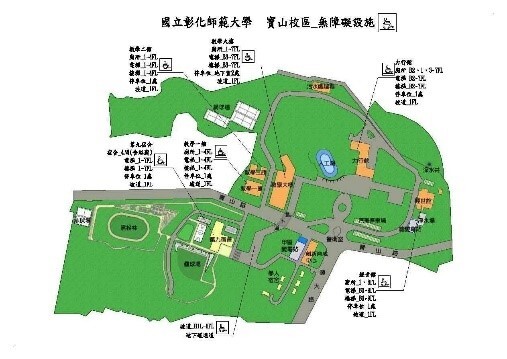
Map of the accessible facilities on NCUE’s Baoshan campus
4. Priority accommodation for students with disabilities
There are seven dormitories on campus, with a maximum capacity of 3,300 students. Every year, NCUE guarantees that freshmen, students with disabilities, overseas Chinese and foreign students, government-funded students, students from outlying islands, students with outstanding athletic performance, disadvantaged indigenous students, and students from low- to middle-income families are given priority in the allocation of accommodation; students from low-income families can live in the dormitory for free. The accommodation for the remaining students is allocated by lottery, and the accommodation rate is as high as 95%. Students with disabilities are entitled to discounts on tuition and miscellaneous fees, while their dormitory accommodation is guaranteed. They may be allocated to accessible dormitories according to their physical and mental conditions.
Table: Statistics on accommodation for students with disabilities in 2021
|
Dormitory |
Number of rooms |
Number of rooms allocated to students with disabilities |
|
3rd dormitory |
77 |
3 |
|
5th dormitory |
90 |
4 |
|
6th dormitory |
63 |
1 |
|
7th dormitory |
140 |
3 |
|
8th dormitory |
179 |
6 |
|
9th dormitory |
151 |
6 |
|
10th dormitory |
187 |
8 |
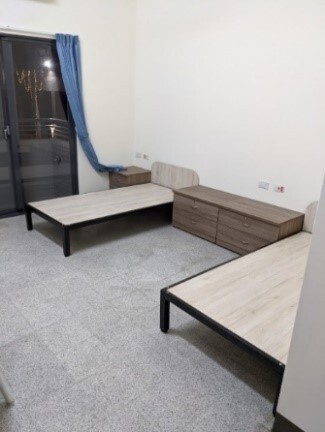
Accessible facilities in dormitories
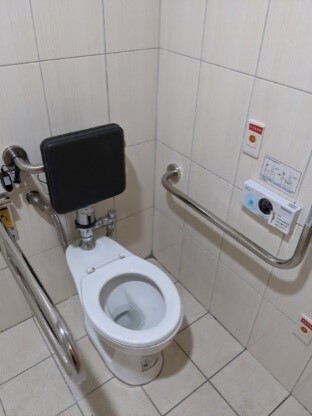
Accessible facilities in dormitory toilets
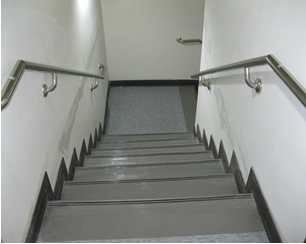
Accessible stairway hand railings
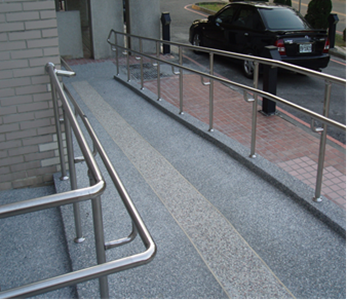
Accessible ramps
5. Operating funds prepared for counseling for students with disabilities
According to the Fundamentals for Subsidizing Universities and Colleges on Recruiting and Counselling Students with Disabilities issued by the Ministry of Education (https://edu.law.moe.gov.tw/LawContent.aspx?id=FL026216), NCUE applies for an annual subsidy from the Ministry of Education provided by the Work Plan of Recruiting and Guiding University and College Students with Disabilities, so as to provide various forms of counseling and services to students with disabilities. In 2021, the Ministry of Education subsidized more than 2.39 million NTD to help students with disabilities with verification reports adapt to university life, expand their networks, and increase their ability to study various courses, so that they can finish their studies successfully. The funds are also used to provide support services that enhance their adaptation to emotional issues, academic matters, society, and employment.
